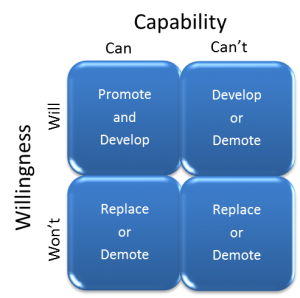Employees are the lifeblood of a company. If they struggle, your company struggles. If they soar, your company soars. If your company is growing rapidly it is probably due to some key employees, but some of the other employees may be drowning and if you don’t watch out, they could very well take the company down with them. If you aren’t growing, well…you may already be going down.
When trying to figure out how to succeed in today’s marketplace, none of us has all the answers…not even you. You need to surround yourself with smart people who can help you can figure it out. Unfortunately, when we hire our first employees, we tend to hire people who:
– Take tasks off our plate
– Do what we tell them
– Are convenient
– Are cheap
As we grow and add more people, the criteria probably don’t change too much. If someone leaves, we replace them with someone pretty similar to them. Suddenly, we look around and we are surrounded by a bunch of task-oriented folks who take direction from us and are pretty comfortable in their job.
For a small company this is fine, but what if you have a grander vision? If you envision a company that runs itself and is a leader in the marketplace, you need your team to perform at a higher level, take on more responsibility, help you define and implement strategies to deliver on your vision, get you out of the day-to-day activities of the business, and work together in a synergistic, aligned way. Will the people who got you here get you there?
Evaluate your current team. Who is capable of performing at a higher level? Who is willing to perform at a higher level? Place each of your employees in one of the quandrants in the figure below:
Willing and able to perform at a higher level – These are the keepers. Daniel Pink says that the key to keeping and motivating good employees it to give them autonomy, mastery, and purpose. Giving them more responsibility, providing development or training opportunities, and making sure they buy into your vision of the company are critical.
Willing, but not able to perform at a higher level – We can teach skills, but we can’t teach attitude. These folks have the right attitude and if they have potential, look for development opportunities like training, coaching, or mentoring to move them to the upper left quadrant. If the potential isn’t there, even though they are willing, you probably need to bring in someone to whom they report.
Able to take on more responsibility, but unwilling to – We can lead a horse to water, but we can’t make him drink. The reasons behind the unwilliness need to be taken into consideration. For instance, if there are work-life balance issues you may be able to remedy that situation. If you can’t resolve the issue or the unwillingess is attitudinal, fear-based, or just a plain lack of initiative, you should either replace them or hire someone more senior to whom they will report.
Unwilling and unable to take on more reponsiblity – They may be good people, but they just don’t have what it takes. In some cases it will be best to replace them, but not always. Some folks are very productive at their current level and duties, so you might want to keep them on in a junior position reporting to a more senior manager.
Of course, every situation is different and these recommendations are just guidelines. I understand that there are always special circumstances, such as family or social relationships within the business that need to be preserved. Keep in mind, however, that the main goal is to develop a team who will allow you to achieve your vision of your company. If they can’t help you get there, they may be holding you back.

